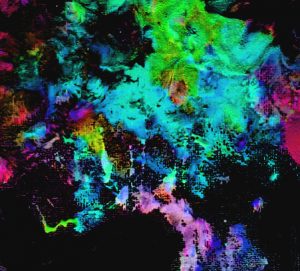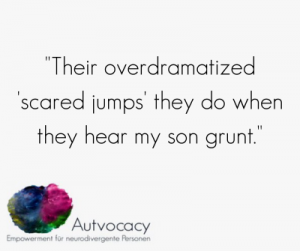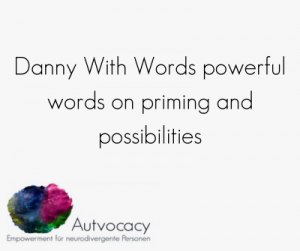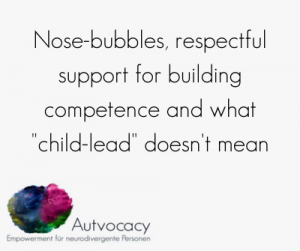“Their overdramatized ‘scared jumps’ they do when they hear my son grunt.”
This is from a social media response to this important post by Fidgets and Fries whose online work I highly recommend. If you are on Substrack or Patreon, this is one of the pages that really merrits financial support, too, as Tiffany Hammond cuts through lots of intersecting dynamics of discrimination to make some much needed points.
In this post, she speaks about how painful those dynamics are every time she, a Black, speaking autistic woman, goes out with her two Black autistic sons, both still in their teens, I think (Aidan might be at the beginnings of his twenties, but I think it’s more the ends of his teen years).
Aidan is non-speaking and has neuromotor differences, which means he’ll jerk and make noises.
This post is so important, and to me, this sencence sticks out most:
“Their overdramatized “scared jumps” they do when they hear my son grunt.”
This is something I’ve been finding words around lately that I have been missing earlier.
Discrimination very often translates to people performing being scared or threatened by marginalised persons.
There is sometimes genuine fear, sure. And sometimes it’s performative.
It comes down to people’s expectations of oneself and of others.
People don’t expect themselves to be scared of quite a few people and their mannerisms.
Some people taking up a lot of space – namely white abled cis-passing men – is just how the world goes. If anything, people expect of themselves to shut up and make room.
Other people taking up space and being loud – or even quiet: a lot of people expect themselves to be threatened and bothered by that.
I am an afab Brown non-binary person with a loud voice and sensorimotor differences that are less apparent to others. Make no mistake, I am so much more priveleged than Aidan is, because I am not a Black autistic young man whose voice and body move in a lot less normative, a lot less intentional ways, in the state of Texas.
I’m not trying to compare those experiences as they cannot compare. Tiffany, Aidan, Jojo live experiences my skin and body and mind never will.
I’m highlighting this.
I can mostly speak, I can fluff up my words, and all my life, people have performed being threatened by me. By my tone of voice, by the strength in my invisbily disabled and painful body, by my opinions. Mostly: by the place I dare to take up – and believe me, this does lead and has lead to me trying to take up less space.
These days, I no longer wear my thick, black hair in long waves, but in unruly, neck-length waves on the one side and a side cut on the other. I don’t brush it often.
I often wear a hoody for sensory reasons.
And that makes another difference in people react to me. Though I am the same, with less energy.
These days, my body aches so much when I’m out, my sensory issues are through the roof.
Most days, I cannot go out.
And when I do, white people perform being threatened by me, being offended by me – and like what Tiffany describes – they will perform this loudly, in my face, for the audiences of others to join and solidate.
Not only when I dare ask for room – sometimes quite literally by asking “would you mind taking a step back?”.
But even when I am quiet. When I struggle to speak at the supermarket cashier because I am so focused on getting things right, on keeping the distance that I need while not taking up more space, by getting my movements right, by focusing on not forgetting my purse or bank card or phone somewhere. By rushing to get to my anxious kid, by struggling if I have forgotten my headphones at home.
By holding my card up to signal this is how I’d like to pay.
White people perform being offended by me, by my perceived rudeness, audacity to not placate them with soft words for existing, when soft words will not come.
Not once in a situation like this have I ever received solidarity from strangers, not once where my startled, yes, angry reactions at being attacked like this supported, not even when my attackers addressed my anxious young kid that was clinging to my body while they spoke down to them in threatening voices informing them that I am not an ok parent and that they feel sorry for them (nevermind for now what a scared young person is even supposed to make of that). When they attack me setting clear boundaries for us.
I certainly have had people threaten to call the police when I was attacked in the first place.
I am not Aidan, or Tiffany or Jojo.
I do not wear their skin, their build, my body moves a lot more quietly than Aidan’s does and moves a lot more in ways that I want it to than Aidan’s does.
This is not a comparison.
This is to pick out this bit: people with more access to power perform being scared of marginalised people, including of the most vulnerable people, to deny them space.
People perform being scared of people a lot young than me or even Aidan – though Aidans age and size is used to feed these performanes even more.
They perform being scared of vulnerable young disabled kids, to contain them in even smaller spaces. To take away even more room from them. To take away their play, to take away space for their bodies to move. To physically restrain them to ostensibly protect others.
They don’t even hold themselves accountable to, expect themselves to come up with respectful support for situations where yes, people might actually get hurt. They don’t expect themselves to build up competence and create spaces that fit their bodies, too.
They might think they are scared, too, but that’s because they tell themselves – and others telll them – that it’s very ok to hold on to this fear, while it wouldn’t be ok to hold on to fear of people who actually hold more power.
That shit is dangerous. And it’s socially accepted.
In this post, Tiffany writes how she lost it that day. And somehow that ends up what is being talked about. Her reaction to lives full of this.
In the comments sections, you’ll have some people defending the other parent, centering the other parent’s experience, lack of knowledging, centering intent.
Impact over intent, yes.
But this is more: who do you allow yourselves to be afraid of, to perform being scared, as a means to question their rights to take up space.
This is about that. I’m finding words to speak to this. I’ll find more precise words soon.
I’m no longer willing to give a stage to this.
Neurodivergent scheduling
Neuronormative scheduling can set us up for failure – but what are the alternatives? Dear neurokin, when scheduling an appointment or a social engagement and someone proposes a specific…
A response to Peter Gray: children who seem to direct play aren’t tyrants – about harmful narratives that marginalise neurodivergent play
I’d like to share my thoughts on a specific part of this post by advocate and researcher Peter Gray. It’s a post where Peter Gray, whose work on play and…
Book Discussion of „A Day with No Words“ by Tiffany Hammond (long version)
*See here for a shorter version. Today is the day: The children’s book „A Day With No Words” by autistic author Tiffany Hammond is officially out. Today is also the…
Book Review of A Day With No Words by Tiffany Hammond
Short Version **For a longer discussion of this book, see here. A Day with No Words, by Tiffany Hammond is beautifully written, lovingly illustrated by Kate Cosgrove, and fills parts…
“Their overdramatized ‘scared jumps’ they do when they hear my son grunt.”
This is from a social media response to this important post by Fidgets and Fries whose online work I highly recommend. If you are on Substrack or Patreon, this is…
Danny With Words powerful words on priming and possibilities
If you aren’t already, I cannot recommend following Danny With Words enough. This post is a social media response to Danny’s list about the kinds of preparation and priming that…
Nose-bubbles, respectful support for building competence and what “child-lead” doesn’t mean
This was originally a social media response response/addition to a this beautiful post by my friend and neurokin The Peaceful Swim Teacher that merges with things I’ve been wanting to…





